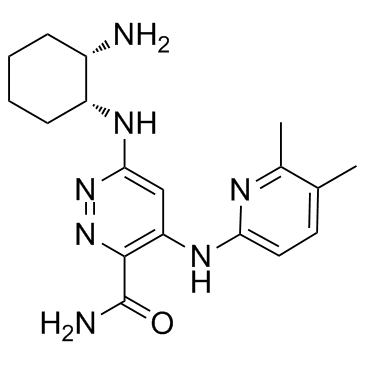| Description |
RO9021 is an orally bioavailable, novel ATP-competitive inhibitor of SYK, with an average IC50 of 5.6 nM.
|
| Related Catalog |
|
| Target |
IC50: 5.6 nM (SYK)
|
| In Vitro |
RO9021 is a highly selective SYK inhibitor with low S-scores of 0.003 for S(99) and 0.015 for S(90), indicating that SYK is the only kinase with 99% competition with RO9021 in a total of 392 tested kinases. RO9021 inhibits anti-IgM induced phosphorylation of BTK, PLCγ2, AKT and ERK, indicating that blockade of SYK kinase activity by RO9021 results in attenuation of BCR downstream signaling cascade. RO9021 selectively suppresses B-cell receptor signaling. RO9021 also displays a similar inhibitory potency (IC50=22.8±1.7 nM) in a FcεR-mediated mast cell activation and degranulation assay[1].
|
| Kinase Assay |
The inhibitory potency to SYK is determined in a radiometric assay using inactive SYK kinase. Briefly, SYK protein is dephosphorylated by PTP1B phosphatase and then the reaction is initiated by the addition of substrate cocktail that contained 20 μM ATP, 0.025 μCi ATP-γ-33P and 10 μM biotinylated synthetic peptide. The reaction is carried out for 30 minutes and resulting 33P incorporation is determined by top counter.
|
| Animal Admin |
Briefly, DBA1/J male mice are injected intradermally with 0.1 mL bovine type II collagen (100 μg) and complete Freund’s adjuvant followed by second immunization on day 21 with bovine type II collagen and incomplete Freund adjuvant. RO9021 is administered orally, randomized into different groups (14 mice/groups), every day for 14 days starting on the day after second immunization. Clinical arthritis scores (1 to 4) of individual paws are assessed and the arthritic index for each mouse is determined by adding the individual scores of all four paws. The level of cytokines in serum is determined by Luminex analysis.
|
| References |
[1]. Liao C, et al. Selective inhibition of spleen tyrosine kinase (SYK) with a novel orally bioavailable small molecule inhibitor, RO9021, impinges on various innate and adaptive immune responses: implications for SYK inhibitors in autoimmune disease therapy.
|
